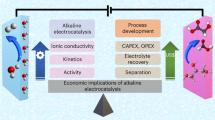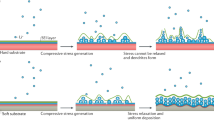Abstract
FROM the electrochemical aspect gallium is notable for its relatively negative standard reference voltage, which for the equilibrium : amounts to −1.22 V (NHE)1. Apart from its low equivalent weight of 23 g/F, another remarkable feature is the high polarization with respect to hydrogen2, which results in it having a high resistance to corrosion, in spite of its base character.
amounts to −1.22 V (NHE)1. Apart from its low equivalent weight of 23 g/F, another remarkable feature is the high polarization with respect to hydrogen2, which results in it having a high resistance to corrosion, in spite of its base character.
This is a preview of subscription content, access via your institution
Access options
Subscribe to this journal
Receive 51 print issues and online access
$199.00 per year
only $3.90 per issue
Buy this article
- Purchase on Springer Link
- Instant access to full article PDF
Prices may be subject to local taxes which are calculated during checkout
Similar content being viewed by others
References
Latimer, W. M., Oxidation Potentials (New York, 1952).
Christov, S. G., and Rajceva, S., Z. Elektrochem., 66, 484 (1962).
Schwabe, K., Z. phys. Chem., 211, 270 (1959).
Guth, E., Telschow, C. G., and Plust, H. G., Brown, Boveri Rev., 49, 20 (1962).
Author information
Authors and Affiliations
Rights and permissions
About this article
Cite this article
JAHN, D., PLUST, H. Possible Use of Gallium as Negative Electrode in Galvanic Cells. Nature 199, 806–807 (1963). https://doi.org/10.1038/199806a0
Issue Date:
DOI: https://doi.org/10.1038/199806a0
This article is cited by
-
Self-healing Ga-based liquid metal/alloy anodes for rechargeable batteries
Nano Research (2024)
-
Perspective on gallium-based room temperature liquid metal batteries
Frontiers in Energy (2022)
Comments
By submitting a comment you agree to abide by our Terms and Community Guidelines. If you find something abusive or that does not comply with our terms or guidelines please flag it as inappropriate.



